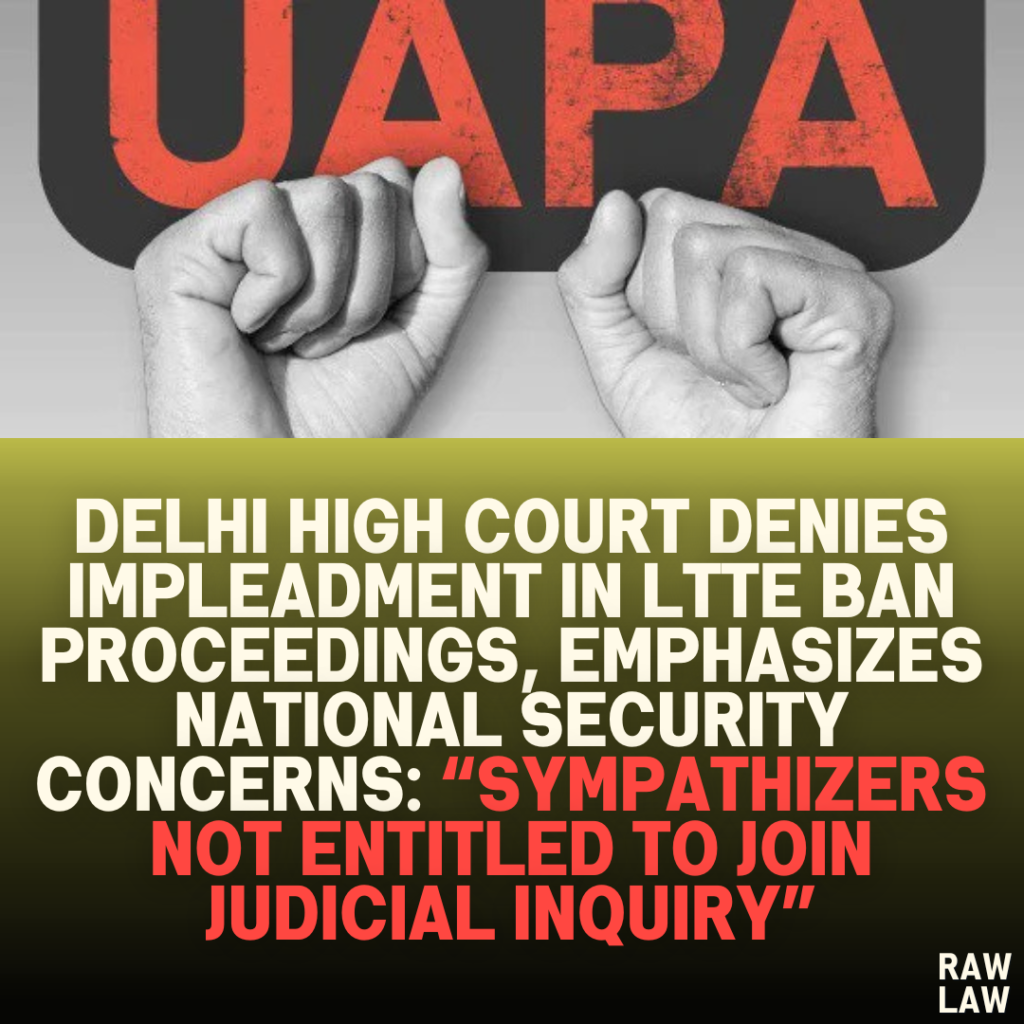Court’s Decision:
The Delhi High Court dismissed the writ petition seeking impleadment in the tribunal proceedings adjudicating the ban on the Liberation Tigers of Tamil Eelam (LTTE) under the Unlawful Activities (Prevention) Act (UAPA), 1967. The Court upheld the tribunal’s decision, ruling that individuals who are mere sympathizers or supporters of a banned organization cannot demand participation in the judicial process unless they hold an official role within the organization.
Facts:
The LTTE, designated as a terrorist organization by the Indian Government, was also declared an unlawful association under UAPA in 1992. This declaration has been periodically renewed, with the latest notification issued on 14th May 2024, prompting the formation of a tribunal for a judicial review of the ban.
The petitioner, claiming to be the Prime Minister of the Transnational Government of Tamil Eelam (TGTE) and a sympathizer of LTTE’s cause, sought to challenge the LTTE ban on the grounds that he represents Tamil sympathizers abroad. The tribunal rejected the petitioner’s request for impleadment in September 2024, prompting the current writ petition.
Issues:
- Whether a sympathizer or supporter of a banned organization, without formal association, holds a legal right to participate in UAPA tribunal proceedings.
- Whether the tribunal’s rejection of the impleadment application infringes on principles of natural justice.
Petitioner’s Arguments:
The petitioner argued that he, as a non-violent sympathizer of the LTTE, had the right to be heard, citing his affiliation with the LTTE cause and involvement in peaceful diplomacy for Tamil rights. He contended that the tribunal proceedings should accommodate credible testimonies, regardless of citizenship, per the Supreme Court’s stance in Jamaat-e-Islami Hind v. Union of India (1995), emphasizing a fair inquiry to validate the government’s decision.
The petitioner also argued that TGTE was acknowledged by the Indian Government as a LTTE-affiliated entity, further underscoring his representative role. Additionally, he argued that the tribunal should exercise flexibility to accept material from credible individuals to maintain judicial rigor.
Respondent’s Arguments:
The Union of India, represented by the Additional Solicitor General, argued against the writ petition’s maintainability, stating that UAPA does not provide an appeal mechanism against tribunal orders. The respondents emphasized that only LTTE members or office-bearers, not sympathizers, are entitled to defend the association in judicial proceedings. They contended that admitting the petitioner’s request could undermine India’s territorial integrity and sovereignty, as UAPA prioritizes national security interests.
Analysis of the Law:
The Court examined the scope of UAPA, which delineates strict procedures for declaring unlawful associations and specifies that only members or office-bearers of a banned organization may engage in tribunal proceedings. Section 4(3) of UAPA does not recognize sympathizers or supporters as eligible participants, limiting tribunal involvement to official members of the organization.
The court referenced Jamaat-e-Islami Hind to clarify that the tribunal must adhere to a fair process, but this does not extend to engaging non-members in proceedings. Moreover, Madhyamam Broadcasting Ltd. v. Union of India provided guidance on the judicial review’s scope, noting the need to cautiously evaluate national security matters.
Precedent Analysis:
The Court referred to previous instances where the Supreme Court ruled that tribunals, even in cases related to national security, must uphold judicial scrutiny but not accommodate parties without legal standing. In line with Rajendra Diwan v. Pradeep Kumar Ranibala, the Court held that writ jurisdiction should be exercised sparingly, particularly when tribunal orders are founded on legally sound and non-arbitrary principles.
Court’s Reasoning:
The Court reasoned that the petitioner’s claims of sympathizing with the LTTE did not confer any legal standing in UAPA proceedings. It affirmed the tribunal’s position that TGTE’s status as a political entity did not align with LTTE’s banned status under UAPA, making the petitioner ineligible to intervene.
The Court further observed that national security considerations justified limiting tribunal participation to direct LTTE members. Notably, the Court held that judicial scrutiny must not compromise procedural integrity where security concerns arise.
Conclusion:
The Delhi High Court concluded that the tribunal’s decision was neither arbitrary nor perverse, thereby warranting no interference. The Court affirmed that LTTE sympathizers, especially non-Indian nationals, lack the right to participate in UAPA tribunal inquiries concerning LTTE’s designation as an unlawful association.
Implications:
This judgment underscores the stringent procedural framework governing UAPA tribunal proceedings, restricting judicial engagement to formally associated individuals. The decision reinforces India’s policy of maintaining sovereignty and national security through limited judicial review, particularly in cases involving foreign nationals and banned organizations.




Pingback: Delhi High Court Upholds FIR Alleging Deceptive Inducement in Investment Fraud: "Withdrawal of Prior Complaint Does Not Preclude FIR Registration Where Cognizable Offense is Disclosed" - Raw Law